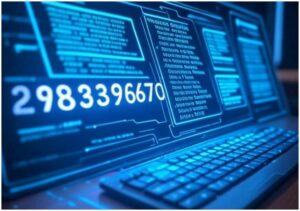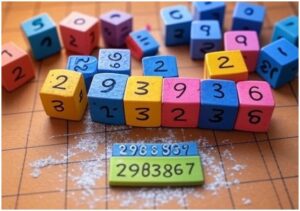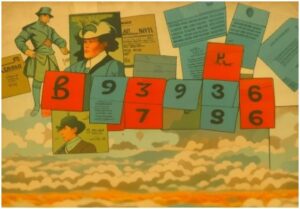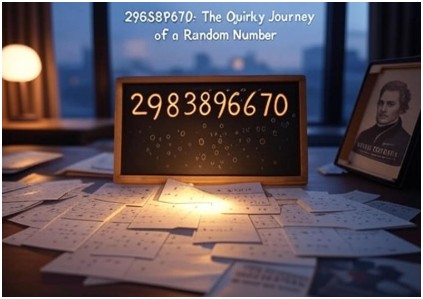I have a weird habit of getting fascinated by random numbers. One day, while scrolling through an old forum about vintage posters, I stumbled upon 298389670 hidden inside an order ID. It didn’t look special at first… just a string of digits.
But my brain whispered, “What if this number has a story?” So, I followed the trail—and to my surprise, it led me into a quirky mix of math, digital breadcrumbs, and a bit of history.
If you’ve ever wondered how something as plain as 298389670 can become oddly captivating, stick with me. I promise this won’t feel like your old math class.
What Exactly Is 298389670?

Before I got carried away by theories, I needed to know what this number truly was. Turns out, 298389670 is a decimal (base-10) integer. It’s not mystical, but it does have a secret life in different number systems.
In binary (the language of computers), it looks like this:
10001110010010001000010100110₂
When converted into hexadecimal, it becomes 11C910A6₁₆. And in octal, it appears as 2162210246₈. Seeing the same number dressed up in different systems made me realize how versatile numbers can be—kind of like how one outfit can totally change someone’s vibe.
So yes, 298389670 may look random, but it can slip into many forms depending on the world it’s living in—decimal for us, binary for machines, and hex for programmers.
Is 298389670 a Prime Number or Not?

The next thing I wanted to know was whether this number was prime. Spoiler alert: 298389670 is not a prime number. It’s a composite number, which means it has factors besides just 1 and itself.
Here’s what I discovered about its factors:
| Property | Value |
| Prime factorization | 2 × 5 × 29838967 |
| Divisors | 1, 2, 5, 10, 29838967, 59677934, 149194835, 298389670 |
That little table might seem dry, but knowing a number’s factors feels like learning its DNA. It’s a reminder that every big number has smaller building blocks inside it. Kind of poetic, don’t you think?
Where Has 298389670 Shown Up in the Real World?

This was the fun part. Numbers often hide quietly in the background of our lives, but 298389670 has popped up in some oddly specific places.
One of its sightings was buried in an order ID: IDF298389670, which belonged to a customer buying a poster of Oliver Cromwell on UkPosters. Seeing such a historic figure linked to a random string of digits made me smile—history meets e-commerce.
Another sighting was in an old forum post about a Presbyterian neurology group. It showed up among a list of contact numbers and codes, like it was part of someone’s data entry day.
That moment made me realize how numbers travel. They don’t just sit still; they get reused, repurposed, and reborn in totally unrelated worlds.
How Can You Decode 298389670 Yourself?
Okay, so maybe you’re like me and you want to play detective with numbers. Breaking down something like 298389670 isn’t as scary as it sounds. Here’s how I do it when curiosity hits:
Step 1 – Convert It to Different Bases
Plug the number into a free online converter and watch it morph into binary, hexadecimal, and octal forms. It’s satisfying to see the patterns emerge.
Step 2 – Check for Prime or Composite
Use a factorization tool or even a spreadsheet to see if it has any divisors besides 1 and itself. That’s how I discovered the 2 × 5 × 29838967 pattern.
Step 3 – Search Where It’s Been Used
Drop the number into search engines inside quotes (“298389670”). Sometimes it pops up in databases, order numbers, or archived forums. It’s like digital archaeology.
Doing this doesn’t just satisfy curiosity—it makes you appreciate how even the blandest number has a history if you look closely enough.
What Kind of Number Is 298389670 Mathematically?
The math nerd in me wanted to label 298389670 properly, so I dove into its classification:
- It’s a natural number because it’s a positive counting number.
- It’s also a whole number because it’s not negative.
- It’s an integer, meaning it’s not a fraction or decimal.
- And it’s rational, because it can be written as a fraction like 2983896701\frac{298389670}{1}1298389670.
None of this makes it famous, but it does make it complete. Like a character in a story, even a number needs a proper identity card.
FAQs About 298389670
Q1: Does 298389670 have any special meaning?
Not officially. It’s not a known code, password, or symbol. It has popped up as part of order IDs and forum lists, but that’s more about coincidence than significance. It’s a number that gets borrowed, not celebrated.
Q2: Could 298389670 be a secret code or hidden message?
It’s tempting to think so, but no evidence supports that. I looked through various databases and nothing points to it being a cipher or reference code. Sometimes a number is just… a number.
Q3: Why would someone care about 298389670?
Honestly? Curiosity. Some people (like me) just enjoy exploring patterns. Numbers like this can also appear in puzzles, research datasets, or as placeholders in testing systems.
Q4: Can 298389670 be used for anything practical?
It can! You can use it as a sample data point, a seed number in coding experiments, or a reference ID in projects. Just don’t assume it has hidden meaning—it’s better used as a blank slate.
Why This Random Number Stole My Heart
Chasing down the trail of 298389670 taught me something strange yet beautiful: meaning is something we give to things, not something they’re born with.
This number started as a dull string of digits. Then it became a mini adventure—filled with math, hidden traces, and the thrill of discovery.
So the next time a random number catches your eye, don’t ignore it. Follow it. You might not uncover a secret code, but you will find a spark of wonder in the ordinary. And honestly, that’s way cooler than any hidden message.
Personal Tip Before You Go
If you ever get bored, pick a number—any number—and investigate it. Treat it like a mystery novel. Look for patterns, conversions, sightings, and meanings.
It’s surprisingly relaxing and makes you see the invisible threads holding our digital world together. That’s what 298389670 did for me… and I kind of love it for that.

